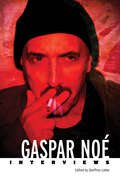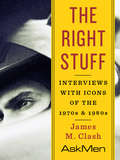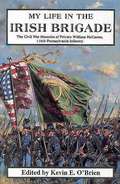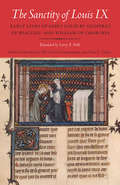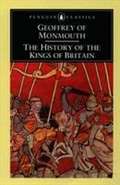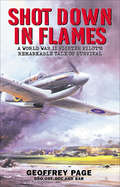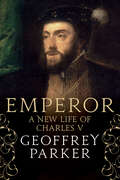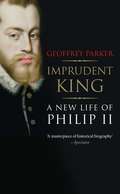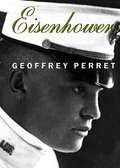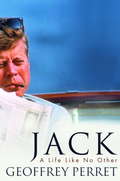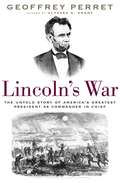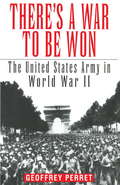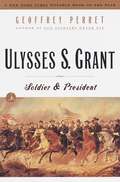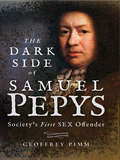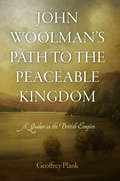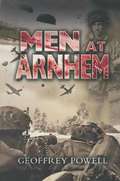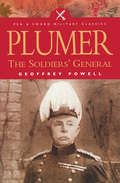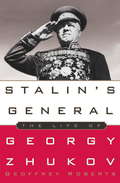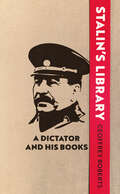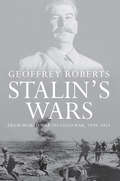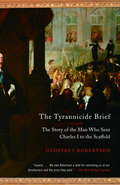- Table View
- List View
Gaspar Noé: Interviews (Conversations with Filmmakers Series)
by Geoffrey LokkeSince the release of his breakout film Irréversible in 2002, Gaspar Noé (b. 1963) has been labeled the principal provocateur of twenty-first-century French cinema. While many of the filmmaker’s complex and daring works have been reduced by his critics to their (innumerable) depictions of hallucinogens, violence, and unsimulated sexual intercourse—the latter rendered into vertiginous 3D with his film Love—other viewers have remained in steady awe of Noé’s dizzying camerawork, immersive visuality, and expressive editing. Noé’s cinema greets the short attention spans of digital life with works of extremities and endurance for performers and spectators alike. This first-of-its-kind collection of interviews documents Noé’s engagement with the feverish reception of his work and received ideas about his life and politics. Collecting conversations with critics, scholars, and artists, including fellow directors Matthew Barney, Abel Ferrara, and Harmony Korine, Noé speaks about his process as a writer, director, cinematographer, and editor. Also examined are his engagement with developing film technology and his fascination and indebtedness to past filmmakers such as Pier Paolo Pasolini, Jean Eustache, Stanley Kubrick, and Sam Peckinpah. Noé discusses life in Buenos Aires and emigrating to France, his use of irony and melodrama, and his interest in documentary practices. Throughout, Noé explores his continuing examination of faith and secularism, body and mind, and the politics of spectatorship. Editor Geoffrey Lokke’s introduction provides a close reading of Noé in conversation, assessing what has changed over the years in terms of the filmmaker’s aesthetics and presentation of self, as well as what Noé is reticent to articulate about his life and art.
Environmental Engineer (Cool Cutting Edge Careers)
by Geoffrey M. HornHow can we keep our drinking water pure? Whats the best way to dispose of our waste? How can we limit pollution? Answering these questions is the job of environmental engineers. Using the latest technology and research, environmental engineers are changing our world. Learn about the many different jobs that make up this cutting-edge career.
The Right Stuff: Interviews with Icons of the 1970s and 1980s
by Geoffrey Notkin James M. ClashIn The Right Stuff: Interviews with Icons of the 1970s and 1980s, journalist, Explorers Club fellow and author James M. Clash has compiled 19 of his rare interviews with the scientists, athletes and explorers of the '70s and '80s who expanded our conception of the limits of mankind. Come and take a look back with us at this incredible era through interviews with the likes of astronaut Alan Bean, F1 driver Sir Jackie Stewart, the late Joe Frazier, Mario Andretti and many more. "The 1960s, when I did my 102,800-ft. parachute jump, was a time of big change. But what many don't remember is that in the '70s, much of that technological development came to fruition. Eight of the twelve astronauts who walked on the moon did so in the 1970s. Jim Clash's book captures the spirit of that time period with insightful interviews of the big players." - Joe Kittinger, author of Come Up and Get Me "As a child of the '70s, I was inspired by many of the icons Jim Clash interviews in this book. The insights presented here into their pioneering efforts, feelings about their successes and failures and humility (or arrogance) along the way are fascinating to read. This book will surely make a welcome addition to the library of any explorer, history buff or adrenaline junkie." - Josh Bernstein, Explorer & Educator "When treating Beck Weathers [Into Thin Air] for frostbite on Everest, I came across a number of explorers in dicey situations. In his new book, Jim Clash captures the essence of such risk directly from the mouths of those who do it regularly -- climbers, astronauts, boxers. No wannabes here. I recommend this gem to all my climber friends, especially the part about Dick Bass and Seven Summits." - Dr. Ken Kamler, author of Surviving the Extremes
My Life in the Irish Brigade: The Civil War Memoirs of Private William Mccarter, 116th Pennsylvania Infantry
by Geoffrey O'Brien Kevin E. O'Brien William McCarterThe Civil War Memoirs of Private William McCarter, 116 Pennsylvania Infantry William McCarter, a 21-year-old Irish immigrant, was present at the storming of Marye's Heights at the battle of Fredericksburg and left behind observations of several prominent Union personalities as well as daily life in the Army of the Potomac.
The Sanctity of Louis IX: Early Lives of Saint Louis by Geoffrey of Beaulieu and William of Chartres
by Geoffrey Of Beaulieu William Of ChartresLouis IX of France reigned as king from 1226 to 1270 and was widely considered an exemplary Christian ruler, renowned for his piety, justice, and charity toward the poor. After his death on crusade, he was proclaimed a saint in 1297, and today Saint Louis is regarded as one of the central figures of early French history and the High Middle Ages. In The Sanctity of Louis IX, Larry F. Field offers the first English-language translations of two of the earliest and most important accounts of the king’s life: one composed by Geoffrey of Beaulieu, the king’s long-time Dominican confessor, and the other by William of Chartres, a secular clerk in Louis’s household who eventually joined the Dominican Order himself. Written shortly after Louis’s death, these accounts are rich with details and firsthand observations absent from other works, most notably Jean of Joinville’s well-known narrative The introduction by M. Cecilia Gaposchkin and Sean L. Field provides background information on Louis IX and his two biographers, analysis of the historical context of the 1270s, and a thematic introduction to the texts. An appendix traces their manuscript and early printing histories. The Sanctity of Louis IX also features translations of Boniface VIII’s bull canonizing Louis and of three shorter letters associated with the earliest push for his canonization. It also contains the most detailed analysis of these texts, their authors, and their manuscript traditions currently available.
The History of the Kings of Britain
by Geoffrey Of MonmouthCompleted in 1136, The History of the Kings of Britain traces the story of the realm from its supposed foundation by Brutus to the coming of the Saxons some two thousand years later. Vividly portraying legendary and semi-legendary figures such as Lear, Cymbeline, Merlin the magician and the most famous of all British heroes, King Arthur, it is as much myth as it is history and its veracity was questioned by other medieval writers. But Geoffrey of Monmouth's powerful evocation of illustrious men and deeds captured the imagination of subsequent generations, and his influence can be traced through the works of Malory, Shakespeare, Dryden and Tennyson. Translated and with an introduction by Lewis Thorpe.
Shot Down in Flames: A World War II Fighter Pilot's Remarkable Tale of Survival
by Geoffrey PageA pilot&’s first-hand account of the Battle of Britain. &“Quite simply one of the best books I have ever read about the men who fought the war in the air.&” —Daily Mail On 12 August 1940, during the Battle of Britain, in an engagement with Dornier Do 17s, Geoffrey Page was shot down into the English Channel, suffering severe burns. He spent much of the next two years in hospitals, undergoing plastic surgery, but recovered sufficiently to pursue an extremely distinguished war and postwar career. This eloquently written and critically acclaimed autobiography tells of his wartime exploits in the air and on the ground. He was a founding member of The Guinea Pig Club—formed by badly burnt aircrew—and this is a fascinating account of the Club, of the courage and bravery of &“The Few,&” and of Geoffrey&’s later life and achievements, most particularly in the creation of The Battle of Britain memorial.&“For sheer narrative power, it ranks with the best.&” —The Daily Telegraph
Emperor: A New Life of Charles V
by Geoffrey ParkerThis “elegant and engaging” biography dramatically reinterprets the life and reign of the sixteenth-century Holy Roman Emperor: “a masterpiece” (Susannah Lipscomb, Financial Times).The life of Emperor Charles V (1500–1558), ruler of Spain, Germany, the Netherlands, and much of Italy and Central and South America, has long intrigued biographers. But capturing the nature of this elusive man has proven notoriously difficult—especially given his relentless travel, tight control of his own image, and the complexity of governing the world’s first transatlantic empire.Geoffrey Parker, one of the world’s leading historians of early modern Europe, has examined the surviving written sources in Dutch, French, German, Italian, Latin, and Spanish, as well as visual and material evidence. In Emperor, he explores the crucial decisions that created and preserved this vast empire, analyzes Charles’s achievements within the context of both personal and structural factors, and scrutinizes the intimate details of the ruler’s life for clues to his character and inclinations. The result is a unique biography that interrogates every dimension of Charles’s reign and views the world through the emperor’s own eyes.
Imprudent King
by Geoffrey ParkerPhilip II is not only the most famous king in Spanish history, but one of the most famous monarchs in English history: the man who married Mary Tudor and later launched the Spanish Armada against her sister Elizabeth I. This compelling biography of the most powerful European monarch of his day begins with his conception (1526) and ends with his ascent to Paradise (1603), two occurrences surprisingly well documented by contemporaries. Eminent historian Geoffrey Parker draws on four decades of research on Philip as well as a recent, extraordinary archival discovery#151;a trove of 3,000 documents in the vaults of the Hispanic Society of America in New York City, unread since crossing Philip’s own desk more than four centuries ago. Many of them change significantly what we know about the king. The book examines Philip’s long apprenticeship; his three principal interests (work, play, and religion); and the major political, military, and personal challenges he faced during his long reign. Parker offers fresh insights into the causes of Philip’s leadership failures: was his empire simply too big to manage, or would a monarch with different talents and temperament have fared better?
Imprudent King: A New Life of Philip II
by Geoffrey ParkerPhilip II is not only the most famous king in Spanish history, but one of the most famous monarchs in English history: the man who married Mary Tudor and later launched the Spanish Armada against her sister Elizabeth I. This compelling biography of the most powerful European monarch of his day begins with his conception (1526) and ends with his ascent to Paradise (1603), two occurrences surprisingly well documented by contemporaries. Eminent historian Geoffrey Parker draws on four decades of research on Philip as well as a recent, extraordinary archival discovery--a trove of 3,000 documents in the vaults of the Hispanic Society of America in New York City, unread since crossing Philip's own desk more than four centuries ago. Many of them change significantly what we know about the king. Â The book examines Philip's long apprenticeship; his three principal interests (work, play, and religion); and the major political, military, and personal challenges he faced during his long reign. Parker offers fresh insights into the causes of Philip's leadership failures: was his empire simply too big to manage, or would a monarch with different talents and temperament have fared better?
Glenn Gould: Music & Mind
by Geoffrey PayzantBiography of the famous pianist, including a bibliography, list of published compositions, filmography, and discography
Eisenhower
by Geoffrey PerretDrawing on newly available material, including Eisenhower's papers and diaries, author and military historian Geoffrey Perret offers a comprehensive portrait of the life, military exploits, political life, and presidency of Dwight D. Eisenhower (1890-1969). He covers several controversies including an alleged dalliance, Eisenhower's break with MacArthur in 1939, his opinion of Nixon, and his role in McCarthy's activities. Annotation c. Book News, Inc., Portland, OR (booknews.com)
Jack: A Life Like No Other
by Geoffrey PerretPrevious biographies of John F. Kennedy have been based almost entirely on newspaper files and personal recollections. Geoffrey Perret's Jack is both the first comprehensive one-volume biography of JFK and the first account of his life based on the extensive and important documentary record that has finally become available, including Kennedy's personal diaries, hundreds of hours of taped conversations from the White House, recently declassified government documents, extensive family correspondence, and crucial interviews sealed for nearly forty years. The result is a gripping, accurate, and ultimately moving portrait of America's most charismatic president. Jack provides much-needed context and perspective on Kennedy's bewilderingly complex personality. It offers an even-handed account of the seamy side of his life - orgies and abortions, health and drug problems - along with valuable insights into JFK's truly idealistic and visionary character. Jack presents a compelling account of the volatile relationship between Kennedy and his wife, including Jackie's attempt to divorce him, move to Hollywood, and become a film star. At the same time Perret explains how, together, they created the Kennedy style. Jack reveals how the restless, innovative Kennedy was able to overturn more than a hundred years of political tradition, forge the modern political campaign, and, once in the White House, modernize the presidency. His success was so complete that all serious presidential candidates since 1960 have sought to compare themselves to JFK, not challenging his legacy but embracing it. Jack is filled, too, with numerous revelations, such as the true story behind the lobotomy of JFK's sister Rosemary. And here, for the first time, is a comprehensive account of Kennedy's numerous and varied ailments from childhood on, including his back problems. Perret describes how JFK got the two most important decisions of his administration right: his handling of the Cuban missile crisis and his stance on civil rights. As to Vietnam, Kennedy did not believe it was worth fighting for, and in the last months of his presidency he began formulating a secret plan for neutralization and withdrawal - if he won the 1964 election. But that, of course, was not to be: Convinced he would die young, Kennedy foresaw that a violent death would claim him. Throughout his brief time in the White House he was haunted by a vision of a man standing at a window, looking down at him, holding a rifle. Jack: A Life Like No Other is a book like no other. Here, at last, John F. Kennedy seems to step off the page in all his vitality, charm, and originality.
Lincoln's War: The Untold Story of America's Greatest President as Commander-In-Chief
by Geoffrey PerretThis is a readable and yet scholarly work which serves as both history and biography. "Incredible as it may seem to us, when Lincoln became president, there was still a question as to whether the president, even acting as commander in chief, had the power to determine military policy. It fell to Lincoln to create the role of commander in chief. This book tells how he did that and how, in so doing, he created the modern presidency."
There's a War to Be Won: The United States Army in World War II
by Geoffrey PerretTHERE'S A WAR TO BE WON is the landmark story of one of the greatest armies in history, a conscript force of amateur soldiers who had an unparalleled record of combat success. Here -- for the first time in one volume -- is the chronicle of the United States Army's dramatic mobilization and stunning march to victory in World War II.In a lively and engrossing narrative that spans theaters of operations around the world, Geoffrey Perret tells how the Army was drafted, trained, organized, armed, and led at every stage of the war. Beginning with the prescient military planners of the 1930s, he offers vivid warts-and-all profiles of the farsighted commanders who would lead the way, men like Marshall, MacArthur, Eisenhower, Ridgway, Bradley, and Patton.Drawing heavily on important new source material in major archives throughout the United States, THERE'S A WAR TO BE WON offers new insights into the wartime Army, its commanders, and its battles. A major work of American military history."An immensely readable, well-researched history . . . Dramatic." -- Chicago TribuneFrom the Paperback edition.
The Dark Side of Samuel Pepys: Society's First Sex Offender
by Geoffrey PimmThis historical biography reveals how the famous diarist of Restoration England used his professional position to act as a sexual predator. Samuel Pepys is popularly known as the founder of the modern navy, a member of the Royal Society and, most of all, as a unique and frank diarist. Less well known is that he was a serial sexual offender by modern standards; a voyeur, a groper, and a rapist. Set against the London society of Charles II&’s restoration, and extensively using Pepys&’ own words, this book concerns his numerous extramarital affairs. It demonstrates how he used his position of power and influence to advance the careers of his subordinates—in return for the sexual favors of their wives. With his own descriptions, translated from the strange mix of languages and the seventeenth-century shorthand he used to camouflage the content, the reader witnesses in graphic detail how Pepys set about achieving his lascivious objectives – on occasion resorting to physical force where persuasion or bribery failed. Whether she be wife, daughter, mother, or humble maidservant, no woman was safe from his rapacious sexual appetite.
John Woolman's Path to the Peaceable Kingdom
by Geoffrey PlankThe abolitionist John Woolman (1720-72) has been described as a "Quaker saint," an isolated mystic, singular even among a singular people. But as historian Geoffrey Plank recounts, this tailor, hog producer, shopkeeper, schoolteacher, and prominent Quaker minister was very much enmeshed in his local community in colonial New Jersey and was alert as well to events throughout the British Empire. Responding to the situation as he saw it, Woolman developed a comprehensive critique of his fellow Quakers and of the imperial economy, became one of the most emphatic opponents of slaveholding, and helped develop a new form of protest by striving never to spend money in ways that might encourage slavery or other forms of iniquity.Drawing on the diaries of contemporaries, personal correspondence, the minutes of Quaker meetings, business and probate records, pamphlets, and other sources, John Woolman's Path to the Peaceable Kingdom shows that Woolman and his neighbors were far more engaged with the problems of inequality, trade, and warfare than anyone would know just from reading the Quaker's own writings. Although he is famous as an abolitionist, the end of slavery was only part of Woolman's project. Refusing to believe that the pursuit of self-interest could safely guide economic life, Woolman aimed for a miraculous global transformation: a universal disavowal of greed.
Men at Arnhem
by Geoffrey PowellWhen Men at Arnhem was first published in 1976 the author modestly concealed his identity behind a pseudonym and changed the names of his comrades in arms. But the book was at once recognised as one of the finest evocations of an infantrymans war ever written and those in the know were quick to identify the author. His cover has long since been blown, in this edition Geoffrey Powell adds an introduction in which he identifies the men who fought with him in those eight terrible days at Arnhem in September, 1944. The book cannot be said to be a military history in the strictest sense, even the units involved being unidentified, but the events described are, as the author points out in his introduction, as nearly accurate as memory allowed after a lapse of over thirty years. It is unlikely every to be surpassed as the most vivid first-hand account of one of those epic disasters which we British, in our paradoxical way, seem to cherish above and beyond the most glorious victories.
Plumer: The Soldiers' General (Pen & Sword Military Classics)
by Geoffrey PowellSir Herbert Plumer stood out as an archetypal Colonel Blimp - smart to a fault, white hair, white moustache, pot-belly. But his appearance belies the fact that he was one of the best-performing and best-regarded officers on the Allied side. Plumer's crowning glories were the attack on Messines Ridge in 1917 and his successful implementation of the 'bite and hold' strategy that contributed so much to final victory. Plumer destroyed all his papers, but the author has meticulously researched this biography, and has written a lucid account of this undeservedly neglected hero which throws fresh light on generalship on the Western Front.
Stalin's General: The Life of Georgy Zhukov
by Geoffrey RobertsWidely regarded as the most accomplished general of World War II, the Soviet military legend Marshal Georgy Zhukov at last gets the full-scale biographical treatment he has long deserved. A man of indomitable will and fierce determination, Georgy Zhukov was the Soviet Union's indispensable commander through every one of the critical turning points of World War II. It was Zhukov who saved Leningrad from capture by the Wehrmacht in September 1941, Zhukov who led the defense of Moscow in October 1941, Zhukov who spearheaded the Red Army's march on Berlin and formally accepted Germany's unconditional surrender in the spring of 1945. Drawing on the latest research from recently opened Soviet archives, including the uncensored versions of Zhukov's own memoirs, Roberts offers a vivid portrait of a man whose tactical brilliance was matched only by the cold-blooded ruthlessness with which he pursued his battlefield objectives. After the war, Zhukov was a key player on the geopolitical scene. As Khrushchev's defense minister, he was one of the architects of Soviet military strategy during the Cold War. While lauded in the West as a folk hero--he was the only Soviet general ever to appear on the cover of Time magazine--Zhukov repeatedly ran afoul of the Communist political authorities. Wrongfully accused of disloyalty, he was twice banished and erased from his country's official history--left out of books and paintings depicting Soviet World War II victories. Piercing the hyperbole of the Zhukov personality cult, Roberts debunks many of the myths that have sprung up around Zhukov's life and career to deliver fresh insights into the marshal's relationships with Stalin, Khrushchev, and Eisenhower. A remarkably intimate portrait of a man whose life was lived behind an Iron Curtain of official secrecy, Stalin's General is an authoritative biography that restores Zhukov to his rightful place in the twentieth-century military pantheon.From the Hardcover edition.e was lived behind an Iron Curtain of official secrecy, Stalin's General is a full, fair, and authoritative biography that restores Zhukov to his rightful place in the twentieth-century military pantheon.From the Hardcover edition.
Stalin's Library: A Dictator and his Books
by Geoffrey RobertsA compelling intellectual biography of Stalin told through his personal library &“[A] fascinating new study.&”—Michael O&’Donnell, Wall Street Journal In this engaging life of the twentieth century&’s most self-consciously learned dictator, Geoffrey Roberts explores the books Stalin read, how he read them, and what they taught him. Stalin firmly believed in the transformative potential of words and his voracious appetite for reading guided him throughout his years. A biography as well as an intellectual portrait, this book explores all aspects of Stalin&’s tumultuous life and politics. Stalin, an avid reader from an early age, amassed a surprisingly diverse personal collection of thousands of books, many of which he marked and annotated revealing his intimate thoughts, feelings, and beliefs. Based on his wide-ranging research in Russian archives, Roberts tells the story of the creation, fragmentation, and resurrection of Stalin&’s personal library. As a true believer in communist ideology, Stalin was a fanatical idealist who hated his enemies—the bourgeoisie, kulaks, capitalists, imperialists, reactionaries, counter-revolutionaries, traitors—but detested their ideas even more.
Stalin's Wars: From World War to Cold War, 1939-1953
by Geoffrey RobertsThis breakthrough book provides a detailed reconstruction of Stalin's leadership from the outbreak of the Second World War in 1939 to his death in 1953. Making use of a wealth of new material from Russian archives, Geoffrey Roberts challenges a long list of standard perceptions of Stalin: his qualities as a leader; his relationships with his own generals and with other great world leaders; his foreign policy; and his role in instigating the Cold War. While frankly exploring the full extent of Stalin's brutalities and their impact on the Soviet people, Roberts also uncovers evidence leading to the stunning conclusion that Stalin was both the greatest military leader of the twentieth century and a remarkable politician who sought to avoid the Cold War and establish a long-term detente with the capitalist world. By means of an integrated military, political, and diplomatic narrative, the author draws a sustained and compelling personal portrait of the Soviet leader. The resulting picture is fascinating and contradictory, and it will inevitably change the way we understand Stalin and his place in history. Roberts depicts a despot who helped save the world for democracy, a personal charmer who disciplined mercilessly, a utopian ideologue who could be a practical realist, and a warlord who undertook the role of architect of post-war peace.
The Tyrannicide Brief: The Story of the Man Who Sent Charles I to the Scaffold
by Geoffrey RobertsonCharles I waged civil wars that cost one in ten Englishmen their lives. But in 1649 Parliament was hard put to find a lawyer with the skill and daring to prosecute a king who claimed to be above the law. In the end, they chose the radical lawyer John Cooke, whose Puritan conscience, political vision, and love of civil liberties gave him the courage to bring the king to trial. As a result, Charles I was beheaded, but eleven years later Cooke himself was arrested, tried, and executed at the hands of Charles II.Geoffrey Robertson, a renowned human rights lawyer, provides a vivid new reading of the tumultuous Civil War years, exposing long-hidden truths: that the king was guilty, that his execution was necessary to establish the sovereignty of Parliament, that the regicide trials were rigged and their victims should be seen as national heroes. Cooke’s trial of Charles I, the first trial of a head of state for waging war on his own people, became a forerunner of the trials of Augusto Pinochet, Slobodan Milosevic, and Saddam Hussein. The Tyrannicide Brief is a superb work of history that casts a revelatory light on some of the most important issues of our time.
Einstein's Opponents
by Milena Wazeck Geoffrey S. KobyThis detailed account of the controversy surrounding the publication of Albert Einstein's theory of relativity explores the ferocious popular and academic opposition which at one time encircled one of the most important scientific breakthroughs of the twentieth century. Based on extensive archival research, this fascinating discourse includes a compelling and entertaining examination of the contemporary literature created by Einstein's detractors. Exploring the arguments and strategies, social contexts, and motivations of Einstein's detractors, and providing unique insights into the dynamics of scientific controversies, this book is ideal for anyone interested in the history and philosophy of physics, popular science, and the public understanding of science.
